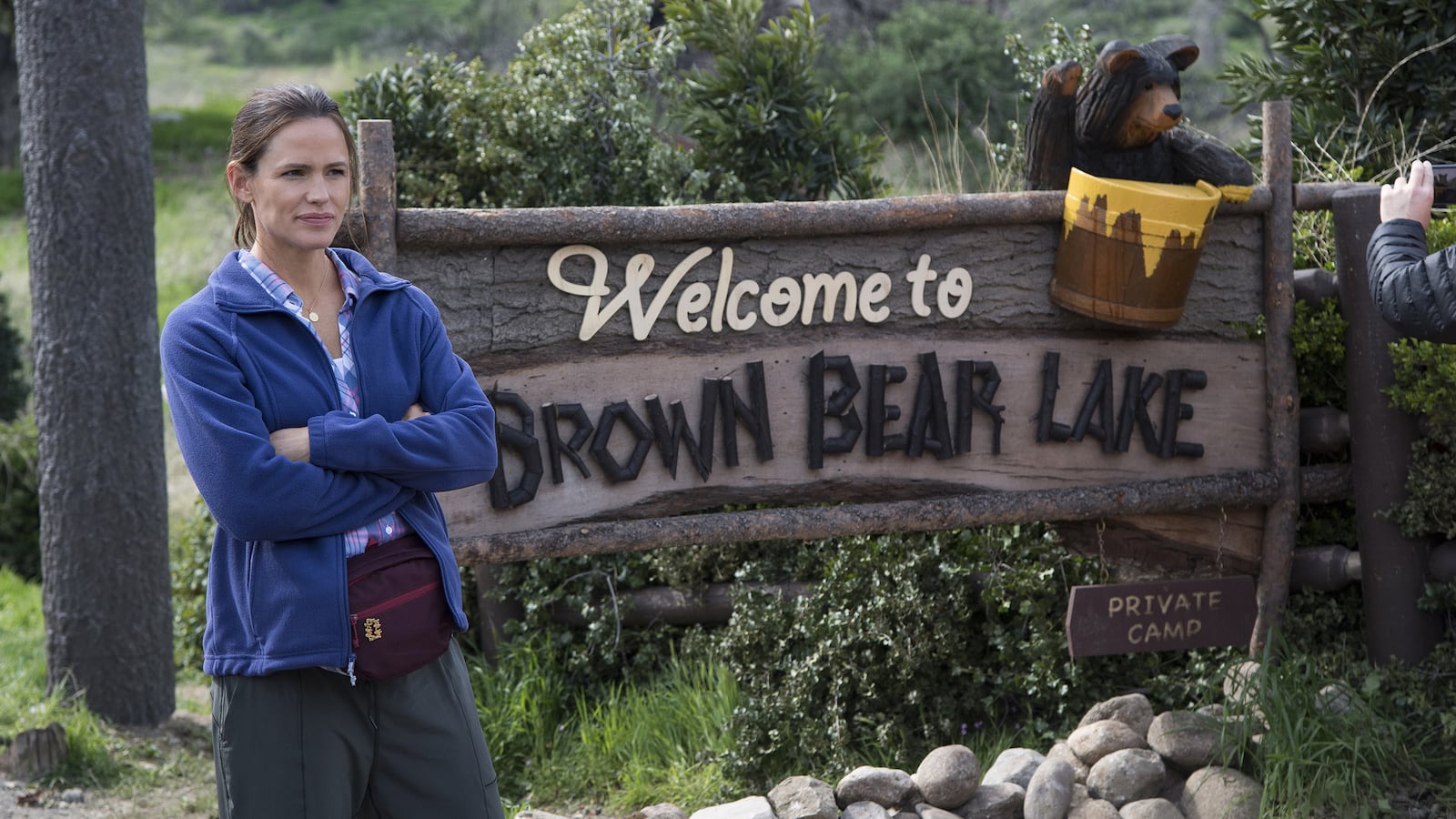We’re all rooting for Jennifer Garner.
It’s an irrefutable fact, and the reason why Camping, Girls creators Lena Dunham and Jenni Konner’s new HBO series, works. Kathryn McSorley-Jodell, the character that Garner plays, is absolutely horrible. But again, it’s Garner. You root for Kathryn anyway. And as the series, which airs its second episode Sunday night, continues, that goodwill morphs Camping from an absurdist comedy about lunatics in the outdoors into a poignant commentary on womanhood and gendered empathy.
Then there’s this: Finally, Jennifer Garner has found a role worthy of her talents.
Camping, essentially, plops a bunch of lunatics in the woods—a group of friends gathering for a birthday trip—and we watch as their neuroses and long-lingering resentments trigger a domino effect of psychotic and emotional breakdowns. Kathryn planned the trip for her husband, David Tennant’s Walt, and surrounds the couple with their friends and family, quite possibly the most deranged and irritating people you’ll see on TV. Even the seemingly innocuous kooks are destructive, like Juliette Lewis’s free-spirited Jandice, who is a DJ, reiki healer, makes and sells her own net cheese, and does some modeling for a figure-drawing class. And she’s a notary.
These people are ghastly, almost unwatchable characters. The fact, then, that these garbage humans are so condescending toward Kathryn and irritated by her speaks volumes. And the message that it screams is precisely the trope that Dunham, Konner, and Garner seem to be trying to subvert: What does it mean to be an “unlikable” or “difficult” woman in today’s world, when we tip-toe around those labels? Or, more specifically, what does it mean to be an unlikable or difficult female character on TV?
That it’s quite possibly the most likable actress in Hollywood playing Kathryn is fascinating. When you cast America’s Sweetheart in a role like this, you can really start to test the audience’s tolerance for her behavior. And when you cast an actress as skilled as Garner, you can start to really make a point. The rest of the ensemble are characters that, for various reasons revealed through the series, are given permission to be unlikable, but they rarely materialize more than quirks and caricatures. It’s Kathryn, through Garner, who actually seems human.
We’re introduced to her in last week’s premiere as she’s leaping in the air, making goofy faces while her husband takes a photo. You’re meant to think she’s in the throes of careless joy, having a ball. But in fact, she’s being hyper-controlling, micro-managing the photo shoot to ensure she gets the perfect picture.
Kathryn suffers from chronic pain, stemming from multiple surgeries and a hysterectomy, and it’s something to which she attaches much of her worth and identity. When she and Walt raid the other tents for extra mattresses before everyone else arrives, she excuses it, telling Walt, “Do you want me to have a dysfunctional pelvic floor the entirety of your birthday weekend?”
Yes, Kathryn really says things like that, delivered with a deadpan sincerity by Garner that makes Kathryn’s overbearingness not only hilarious, but also authentic enough that you don’t necessarily judge it. At least not with the same severity her friends and family do.
When her sister brings her step-daughter on the trip with no warning, Kathryn tries to send her home, hysterically cushioning the harshness with, “If you hop in the car now, you can catch the tail-end of All Things Considered.” She chastises the group for not reading the e-vite “from top to bottom.” When everyone toasts to a fun weekend, she interrupts: “You know what? It might not be fun. It might not be fun at all.”
The “fun” of episode two, if you could call it that—watching Kathryn’s every social interaction is a mini-horror show—is how it starts to peel back more layers.
Garner’s jaw, so clenched in last week’s premiere you marvel that the actress didn’t shatter her teeth, relaxes. Harpy-like tendencies give way to soulfulness and introspection as a health scare with her son transitions into Kathryn seizing the moment to bring the attention back to her chronic pain. It’s a condition rarely explored on TV, and it’s fascinating to navigate how much empathy Kathryn does and doesn’t win by articulating it when we’re so trained, women especially, to soldier through and hide such things.
“That’s the weird thing about life, Orvi,” she tells her son, the ridiculously-named Orvis. “You can feel fine but also know that you are a ticking time bomb. Your insides don’t match your outsides. It’s the scariest part of being human.” It’s such a Lena Dunham and Jenni Konner line. But it’s such a Jennifer Garner delivery.
Garner has a unique skill set that’s only rarely fully used. In her career, she has been the epitome of strength, a steely badass forging her way with an intellectual fortitude to match her physicality. Whether it’s the supreme Alias, or the misfires Elektra and Peppermint, she belongs to an exclusive group of Hollywood actresses who can be bona fide action stars.
But few performers can play delicate and vulnerable as convincingly. It’s her doe-like saucer eyes and the way they tend to dart back and forth as her characters process emotion, or the way she’s able to so softly whisper and tenderly deliver lines while still telegraphing huge feelings. It’s what made her in-demand for romantic comedies and, especially lately, characters who are mothers. Her monologue in Love, Simon, for example, delivered to her son after he comes out as gay, was heartfelt in a way that earned the tears from weeping audiences, whereas so many other performers would have relied on cheap emotional manipulation.
And for being so good at being so tightly wound in Camping, she’s unself-consciously goofy in a way that few actresses allow themselves to be. Her work in 13 Going on 30 might be on of the most underrated lead comedy performance of the last 15 years.
But the thing about Garner, America’s Sweetheart, is that Garner, Hollywood Actress, has been in some real turds lately. Or more accurately, she’s been a standout in movies ranging from so-so to terrible—Alexander and the Terrible…Day, Miracles From Heaven, Butter, the unfortunate Peppermint—and been in good movies that didn’t give her much to do—Dallas Buyers Club, Danny Collins, Wakefield.
Not since Juno in 2006 has she starred in a project where her talents were properly utilized. (Whenever I’m asked about Oscar snubs, I always mention Garner’s work in Juno first.) Maybe it’s because whether she’s roundhouse kicking a spy or whispering while feeling her baby kick in Ellen Page’s stomach for the first time—or, in the case of Camping, trying to wrangle chaos into order—she’s never showy and false, but as nuanced as human behavior actually is.
There are those who really don’t like Camping, which is unsurprising given the show’s apparent mission to itch at but never satisfy viewers. The show’s not perfect, but there’s a shameful bit of Dunham-inspired schadenfreude coloring the more undeserved pans of the show. Still, isolating Garner’s performance and the character she plays, there’s no denying that it feels like something in which she gets to show off her excellence again, without having to restrict or compartmentalize the breadth of how good she is.
This is a fawning love letter, we know. But, hey, it’s Jennifer Garner. We’re all rooting for her. It’s fun to finally get to celebrate her, too.







